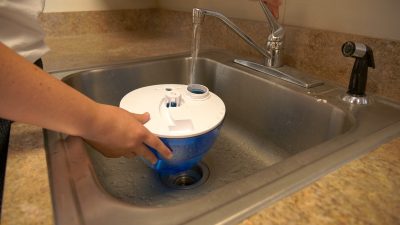
Humidifiers can provide lots of relief during wintertime dryness or sleeping while sick, but it’s essential to keep your humidifier clean. A closed, moist environment — like a humidifier — is the perfect breeding ground for mold, fungus, or bacteria and that’s exactly what you don’t want to be breathing in. Luckily, cleaning your humidifier isn’t too challenging.
With some vinegar, clean water, a brush or cleaning cloth, and a little bit of determination, you can keep your humidifier — and thus, your breathing air — nice and clean.
How to Clean a Humidifier With Vinegar
The method I’ll be covering in this guide uses vinegar to clean and descale your humidifier. However, it is important to note that most humidifiers come with specific cleaning instructions — available in the user manual or on the product’s website. It’s always best to defer to the cleaning instructions specific to your particular humidifier, as there are a variety of types of humidifiers that may require different cleaning methods.
If you don’t have the user manual for your humidifier anymore, I recommend searching for it online to double check the recommended cleaning method. You can generally turn up a PDF of the manual by searching “[name of your humidifier] manual” on Google. Be sure you use the specific model name of your humidifier, as many brands make a number of different models.
I chose to cover this cleaning method with vinegar, as it works for a wide range of humidifiers. I have also often seen a version of this method recommended for humidifiers I have personally tested and reviewed.
Let’s get into the method!
- Assemble the needed supplies: white vinegar and a cleaning brush or cloth.
- Unplug your humidifier and empty out any remaining water from the tank and the base. Disassemble the humidifier as much as you can.
- Pour two cups of white vinegar into the tank of the humidifier. Swish the vinegar around the tank.
- Then either place the tank onto the base (with the vinegar still in it) or pour some vinegar directly into the base of the humidifier. Let that stand for 20 minutes or so.
- After 20 minutes, empty out the vinegar. If there is any remaining scale (mineral buildup, which may appear pinkish), use your cleaning brush or cloth to gently remove it.
- Rinse out all parts of the humidifier until the smell of vinegar is gone.
@sleepopolis humidifiers can be super useful in the winter, but it’s important to keep yours clean! #sleeptok #sleepbetter #humidifier #cleaning #humidifiercheck ♬ original sound – Sleepopolis
Cleaning a Humidifier With Bleach
It’s also important to note that while vinegar can remove some molds, it might not remove all. You can also use bleach to more thoroughly disinfect your humidifier. To do so, follow the same instructions as with vinegar, but use a solution of bleach and water instead of vinegar. Your solution should consist of one teaspoon of bleach per gallon of water.
You can perform both the vinegar and bleach methods (some humidifier manufacturers recommend this), but it is essential that you never mix bleach and vinegar. When vinegar and bleach mix, it creates chlorine gas, a poisonous gas which is extremely dangerous to inhale. If you choose to clean your humidifier with bleach, ensure you have rinsed out all traces of vinegar.
Additionally, you could perform the vinegar cleansing method on a regular basis and utilize the bleach method periodically for a deeper clean.
How Often to Clean a Humidifier
If you use your humidifier regularly, you should clean it on a weekly basis. It’s important to keep it clean to prevent the growth of mold, bacteria, and fungi, as well as to remove scale. Descaling your humidifier with vinegar on a regular basis will ensure it functions properly, as mineral buildup can cause blockages and other malfunctions in a humidifier.
Many people only use their humidifier in the winter or at certain times, such as when they are feeling sick. If you are finished using your humidifier for the foreseeable future, it’s important to clean it thoroughly before storing it. Also be sure that it’s dry before storing. In addition to regular maintenance instructions, many humidifiers come with “end of season cleaning” instructions to achieve a deeper clean before putting your humidifier away for an extended period.
Tips to Keep Your Humidifier Clean
In addition to this simple, weekly cleaning process, there are a few other things you can do to keep your humidifier clean and properly functioning.
- Empty out any remaining water when you’ve finished running your humidifier. Stagnant water creates a prime environment for mold and bacteria growth. If you run your humidifier while sleeping, pour out the remaining water in the morning and give your humidifier a quick wipedown with a clean towel to remove excess moisture.
- If your humidifier uses a wicking filter, flip the filter over each time you refill the tank to allow it to age evenly.
- Additionally, be sure to replace your filter every 30 to 60 days (or whatever is recommended by the manufacturer). Keep an eye on the filter — if it starts to look hardened and crusty, you may need to replace it sooner than recommended.
- Some humidifiers have dishwasher-safe components. If yours does, this provides another easy way to keep your humidifier clean.
- You can also invest in a cleaning cartridge for your humidifier, such as the Protec Humidifer Cleaning Fish.
Final Thoughts
Now that you have reached the end of this guide, hopefully you are well on your way to cleaning your humidifier. If you are interested in learning more about humidifiers, check out our guide on how a humidifier works. Or if you are interested in purchasing a new humidifier, take a look at our roundup of the best humidifiers we have tested here at Sleepopolis.



























